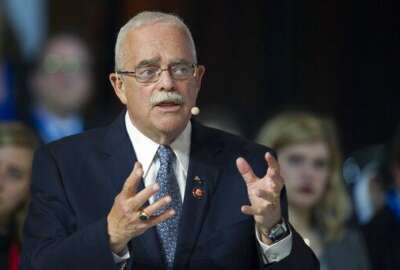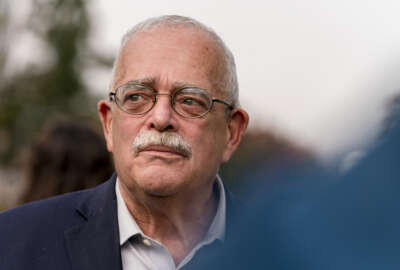House committee pushes forward on encouraging federal telework expansion
The House Oversight and Reform Committee passes federal telework legislation that would call on OPM to offer more guidance and require agencies to report telework...
Members of the House Oversight and Reform Committee took another step to encourage federal agencies to expand their telework programs for the long-haul.
Going beyond anecdotes from many feds that say telework improves work productivity and employee satisfaction, Reps. Gerry Connolly (D-Va.) and John Sarbanes (D-Md.) want to look at data to back up those statements.
The Telework Metrics and Cost Savings Act, which the committee passed 23 to 17 along party lines on June 15, would require the Office of Personnel Management to create data collection standards and gather more information on the outcomes of telework expansion. Connolly and Sarbanes hope data on the benefits of telework would encourage more agencies to increase telework opportunities for eligible employees.
Additionally under the bill, federal supervisors would get training on how to best implement telework policies for eligible employees. Agencies would also receive more guidance from OPM on managing telework programs, and would report annually to OPM and Congress about their goals for expanding telework access.
Connolly said at a June 14 committee hearing that the legislation is necessary to better compete with the private sector and to recruit more early-career federal employees.
“The whole purpose of this bill is to expand telework, to encourage telework [and] to build it into the architecture of the federal workplace,” Connolly said. “The benefits that accrue from it will be structurally available to us as we move forward and recruit and retain the workforce generation of the future.”
The bill would also clarify the definition of remote work, which Connolly said was the original intention of the Telework Enhancement Act of 2010.
The definition of telework is working from home some days in a week, but with no guarantee of fully working from home. Separately, remote work is defined as fully working from home with no expectation to come into the office. That usually applies to employees who are working in a different geographical location. The bill would change the definition so remote work fits under the umbrella definition of telework.
Some agencies, like the Social Security Administration and Equal Employment Opportunity Commission, increased in-office work for public-facing employees, and Connolly said he recognizes telework is not possible for all federal workers. Many have to do their jobs in person. The legislation would develop telework policies only for those who are eligible.
Proponents of the bill said it would improve employee retention and productivity at federal agencies. Rep. Carolyn Maloney (D-N.Y.), the committee’s chairwoman, said telework expansion is essential to federal workforce retention.
“If we want the federal government to be a competitive employer that attracts talented workers, then it needs to prioritize some of the workplace flexibilities that employees can find outside of the government. By and large, private companies are embracing hybrid work models and workplace flexibility,” Maloney said.
Clashes in House committee hearing
Republican committee members, though, disagreed with the legislation, saying that Congress should first get more information about the impacts of telework before pushing the bill through to the full House.
One part of the bill they took issue with centered on the requirement for agencies to report their telework plans. In the bill, if an agency leader wants to reduce telework, the agency must report to both Congress and OPM within 30 days.
Rep. Michael Cloud (R-Texas) said the legislation creates barriers for agencies who expand telework, but later choose to turn back to more in-person work. He said the bill would add hurdles that make it more complicated to undo that decision.
Others raised concerns about the necessity to effectively serve the public and deliver on agency missions. Rep. Andy Biggs (R-Ariz.) pointed to multiple agencies that have backlogs and longer wait times that he said result from increased telework during the COVID-19 pandemic. Biggs also introduced legislation in February that would reinstate pre-pandemic telework policies for agencies.
“Veterans Affairs has a backlog of 190,000 cases as of March of this year. IRS [has] almost 10 million unprocessed individual returns. State Department announced yesterday, [it takes] eight to 11 weeks to wait for a passport. We used to be between six and eight [weeks],” Biggs said.
But Connolly said the backlogs have nothing to do with telework or the COVID-19 pandemic, as those have existed much longer than just the past few years.
“To assert that there’s a backlog because of telework is a completely false narrative and a correlation that does not exist, nor was it meant to exist,” Connolly said. “If we want federal agencies to be efficient and productive, telework has got to be part of their mission. Not in a mindless way, not in a way that is not overseen, but it’s got to be pursued.”
Biggs also proposed an amendment to the legislation that would prevent employees who telework at least three days per week from receiving locality pay. He said teleworking employees could work in areas with a lower cost of living, while still getting paid a higher rate based on their office location. Under current OPM guidance, employees must work in the office at least twice per pay period to receive locality pay. The committee voted 16 to 22 against the amendment.
Rep. Yvette Herrell (R-N.M.) also submitted her SHOW UP Act as an amendment to Connolly’s bill. The legislation calls on agencies to provide a detailed plan to Congress about the adverse effects of remote work on agencies’ missions.
“Under the pandemic, we witnessed and unprecedented reliance on telework across the federal government. This reliance on telework has been to the detriment of the nation’s taxpayers who rely on federal agencies,” Herrell said. “This amendment requires federal agencies to immediately return pre-pandemic levels of telework. The amendment would also require a governmentwide review of pandemic-era teleworking policies.”
But Connolly disagreed with the amendment, saying it would go against the purpose of his initial legislation. Instead, the Telework Metrics and Cost Savings Act plans to add more measurable parameters showing the benefits of telework. The committee did not adopt the amendment.
Ultimately, committee members who opposed to the bill said although they do not disagree with allowing telework opportunities as a whole, there is a long way to go before this type of legislation should be enacted.
“None of us oppose telework in general, but we’ve got to have the parameters to make it work and to make it work well. And I see nothing in this bill that indicates that we are anywhere close to being ready to do so properly,” Rep. Jody Hice (R-Ga.) said.
Telework bill draws support from federal groups
Prior to the committee’s passage of the bill, several federal unions and organizations expressed support for the legislation, including the American Federation of Government Employees, the National Federation of Federal Employees and the International Federation of Professional and Technical Engineers.
The National Treasury Employees Union, another proponent of the bill, said the legislation will go beyond employees’ anecdotes to document the successes of telework, set standards for how telework data is collected by agencies and track the cost savings that telework helped achieve.
“Another important provision is that it will provide much-needed supervisor and manager training on how to properly administer a telework program, thereby fixing a problem that NTEU has dealt with for decades in the enforcement of telework provisions in our agency contracts,” NTEU National President Tony Reardon wrote in a statement to Federal News Network.
The Federal Managers Association said the bill would improve managers’ perceptions about telework.
“Managers have often been blamed for impeding implementation of telework among their employees, and this could be remedied with managerial training on how to best supervise and improve the productivity of teleworkers,” FMA National President Craig Carter said in a June 9 press release.
Committee passes legislation on data, census information
Along with the Telework Metrics and Cost Savings Act, the committee voted favorably on a few other bills that would change data collection and work to improve integrity in the U.S. census.
The Honest Census Communications Act, which Rep. Anna Eshoo (D-Calif.) introduced, would prohibit attempts to communicate false information about a census or stop an individual’s participation in the census. The committee passed the bill in a 22 to 16 vote on June 15.
The committee also considered a bill that would expand data collection on LGBTQI+ individuals. The legislation, which Rep. Raúl Grijalva (D-Ariz.) introduced, would require agencies to assess ways to better incorporate questions on sexual orientation, gender identity and variations in sex characteristics into existing government surveys.
Although some committee members opposed the bill, saying it would infringe on privacy rights of individuals, proponents of the bill said the data collection was optional and would expand information on an underserved population. The committee passed the legislation on June 14.
Copyright © 2025 Federal News Network. All rights reserved. This website is not intended for users located within the European Economic Area.
Drew Friedman is a workforce, pay and benefits reporter for Federal News Network.
Follow @dfriedmanWFED






